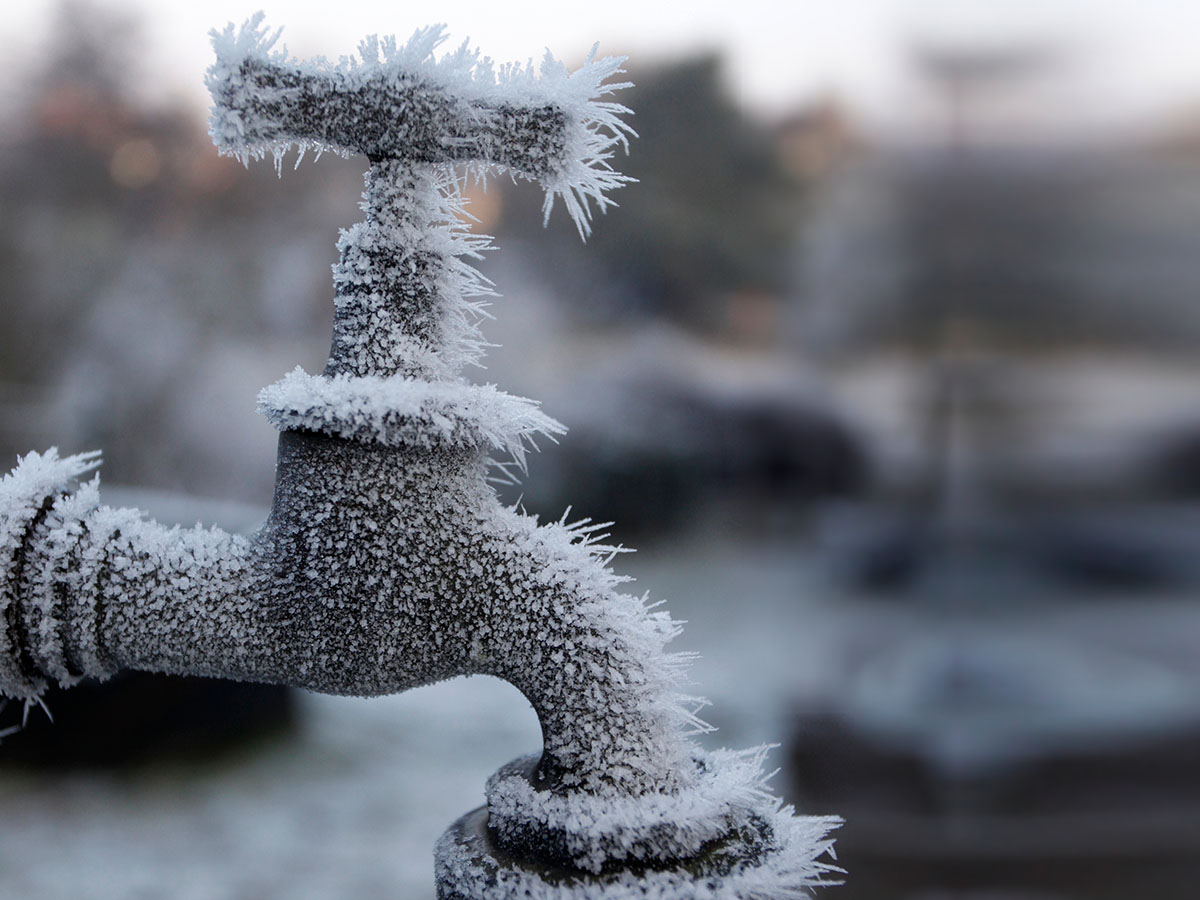Avoid Frozen Plumbing in Cold Weather: Professional Tips
Avoid Frozen Plumbing in Cold Weather: Professional Tips
Blog Article
We have stumbled upon the article pertaining to 6 Ways to Prevent Frozen Pipes listed below on the net and concluded it made good sense to talk about it with you in this article.
:strip_icc()/snow-outdoor-faucet-pipes-4af65d1e5e904fb1aa7bf74071fe5d89.jpg)
Winter can damage your plumbing, especially by freezing pipes. Right here's exactly how to avoid it from occurring and what to do if it does.
Introduction
As temperatures decline, the threat of frozen pipes rises, possibly causing pricey repair services and water damage. Understanding how to stop icy pipes is crucial for home owners in chilly climates.
Avoidance Tips
Protecting vulnerable pipelines
Cover pipes in insulation sleeves or make use of warm tape to shield them from freezing temperatures. Concentrate on pipelines in unheated or exterior areas of the home.
Home heating techniques
Keep indoor spaces appropriately heated, especially areas with plumbing. Open up closet doors to allow warm air to circulate around pipes under sinks.
How to identify icy pipelines
Try to find reduced water flow from taps, unusual odors or noises from pipelines, and visible frost on revealed pipelines.
Long-Term Solutions
Architectural adjustments
Take into consideration rerouting pipelines away from outside wall surfaces or unheated areas. Add added insulation to attic rooms, cellars, and crawl spaces.
Updating insulation
Purchase top notch insulation for pipes, attic rooms, and wall surfaces. Appropriate insulation assists maintain regular temperatures and lowers the threat of icy pipes.
Securing Outside Pipes
Garden pipes and outdoor taps
Detach and drain yard hose pipes prior to winter season. Install frost-proof faucets or cover outdoor taps with shielded caps.
Understanding Icy Pipelines
What causes pipelines to ice up?
Pipes freeze when revealed to temperature levels below 32 ° F (0 ° C) for prolonged durations. As water inside the pipelines ices up, it increases, taxing the pipeline walls and potentially triggering them to break.
Risks and damages
Icy pipelines can result in water supply disturbances, building damages, and pricey repairs. Ruptured pipes can flood homes and cause substantial structural damage.
Signs of Frozen Water Lines
Identifying icy pipes early can avoid them from rupturing.
What to Do If Your Pipes Freeze
Immediate activities to take
If you think frozen pipes, keep faucets open up to ease stress as the ice melts. Utilize a hairdryer or towels taken in warm water to thaw pipelines slowly.
Final thought
Avoiding icy pipelines requires positive measures and fast actions. By recognizing the reasons, indications, and preventive measures, property owners can safeguard their plumbing throughout cold weather.
Helpful Tips to Prevent Frozen Pipes this Winter
UNDERSTANDING THE BASICS: WHY PIPES FREEZE AND WHY IT’S A PROBLEM
Water freezing inside pipes is common during the winter months, but understanding why pipes freeze, and the potential problems it can cause is crucial in preventing such incidents. This section will delve into the basics of why pipes freeze and the associated problems that may arise.
THE SCIENCE BEHIND FROZEN PIPES
When water reaches freezing temperatures, it undergoes a physical transformation and solidifies into ice. This expansion of water as it freezes is the primary reason pipes can burst. As the water inside the pipe freezes, it expands, creating immense pressure on the walls. If the pressure becomes too great, the pipe can crack or rupture, leading to leaks and water damage.
FACTORS THAT CONTRIBUTE TO PIPE FREEZING
Low Temperatures: Extremely cold weather, especially below freezing, increases the risk of pipes freezing. Uninsulated or Poorly Insulated Pipes: Pipes located in unheated areas, such as basements, crawl spaces, or attics, are more prone to freezing. Insufficient insulation or lack of insulation altogether exacerbates the problem. Exterior Wall Exposure: Pipes running along exterior walls are susceptible to freezing as they encounter colder temperatures outside. Lack of Heating or Temperature Regulation: Inadequate heating or inconsistent temperature control in your home can contribute to frozen pipes. PROBLEMS CAUSED BY FROZEN PIPES
- Pipe Bursting: As mentioned earlier, the expansion of water as it freezes can cause pipes to burst, resulting in significant water damage.
- Water Damage: When pipes burst, it can lead to flooding and water damage to your property, including walls, ceilings, flooring, and personal belongings.
- Structural Damage: Prolonged exposure to water from burst pipes can compromise the structural integrity of your home, leading to costly repairs.
- Mold and Mildew Growth: Excess moisture from water damage can create a favorable environment for mold and mildew growth, posing health risks to occupants.
- Disrupted Water Supply: Frozen pipes can also result in a complete or partial loss of water supply until the issue is resolved.
WHY CERTAIN PIPES ARE MORE PRONE TO FREEZING
- Location: Pipes located in unheated or poorly insulated areas, such as basements, crawl spaces, attics, or exterior walls, are at higher risk of freezing.
- Exterior Pipes: Outdoor pipes, such as those used for irrigation or exposed plumbing, are particularly vulnerable to freezing as they are directly exposed to the elements.
- Supply Lines: Pipes that carry water from the main water supply into your home, including the main water line, are critical to protect as freezing in these lines can affect your entire plumbing system.
- Underground Pipes: Pipes buried underground, such as those connected to sprinkler systems or outdoor faucets, can be susceptible to freezing if not properly insulated.
https://busybusy.com/blog/helpful-tips-to-prevent-frozen-pipes-this-winter/

I found that blog posting about 6 Ways to Prevent Frozen Pipes when doing a search on the web. Sharing is nice. You won't know, you will be doing someone a favor. We enjoy reading our article about Winter Plumbing Precautions: Preventing Frozen Pipes.
Need Help? Hire Us Now! Report this page